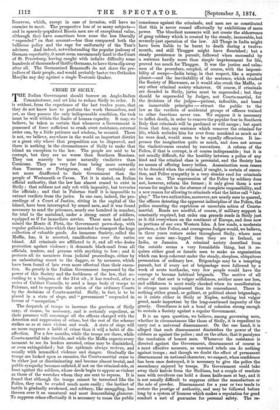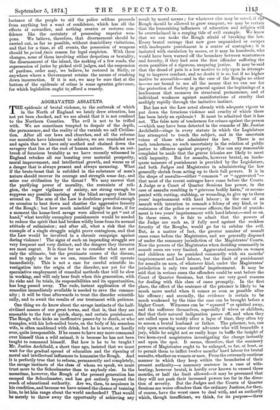CRIME IN SICILY.
THE Italian Government should borrow an Anglo-Indian Commissioner, and set him to reduce Sicily to order. It is evident, from the experience of the last twelve years, that they do not know how to perform the work themselves, and yet, as they possess the only indispensable condition, the task must be well within the limits of human capacity. It may, we believe, be taken as certain that whenever a Government is possessed of force sufficient to crush overt resistance, external order can, by a little patience and wisdom, be secured. There is not, we believe, anywhere in the world an important district or a great city where that proposition can be disproved, and there is nothing in the circumstances of Sicily to make that island an exception to the law. The people are said to be corrupt, but they are no worse than Southern Russians. They can scarcely be more naturally vindictive than Corsicans. They are very far from being more cowardly than Tuscans or Portuguese, and they certainly are not more disaffected to their Government than the people of Westmeath or Cavan. Yet it is stated, on Italian official authority, that the law has almost ceased to exist in Sicily ; that robbers not only rob with impunity, but terrorise the officials ; and that in Palermo itself it is impossible to extract verdicts from the juries. In one case, indeed, the pro- ceedings of a Court of Justice, sitting in the capital of the island, have been interrupted by armed men, and it was found necessary to send the prisoners, nearly one hundred in number, for trial to the mainland, under a strong escort of soldiers, equipped as if for immediate service. These men had under- mined the Monte di Pieth, the Government pawn-shop, with regular galleries, into which they intended to transport the huge collection of valuable goods. An immense Society, called the Maffia, has it is asserted, ramifications over the entire island. Al criminals are affiliated to it, and all who desire protection against violence ; it demands black-mail from all officials, traders, and persons with anything to lose ; and it protects all its members from judicial proceedings, either by an unhesitating resort to the dagger, or by menaces, which have been found of late even more effectual than their execu- tion. So greatly is the Italian Government impressed by the power of this Society and the feebleness of the law, that ac- cording to a telegram of the 31st ult. it has resolved, after a
series of Cabinet Councils, to send a large body of troops to Palermo, and to supersede the action of the ordinary Courts by the decisions of Courts-martial. Sicily, in fact, is to be placed in a state of siege, and " government " suspended in favour of "occupation."
The despatch of troops to increase the garrison of Sicily may, of course, be necessary, and is certainly expedient, as their presence will encourage all the officers charged with the detection and suppression of crime, but the rest of the scheme strikes us as at once violent and weak. A state of siege will no more suppress a habit of crime than it will a habit of dis- affection. For a few months, while the troops are there, while ,Courts-martial take trouble, and while the Maffia expects every moment to see its leaders arrested, crime may be diminished, or even extinguished ; but the epidemic always revives, and usually with intensified violence and danger. Gradually the troops are looked upon as enemies, the Courts-martial cease to be either just or discriminating and become almost brutal, and public sympathy becomes enlisted, if not on the criminal side, at least against the soldiers, whose deeds begin to appear as violent as those of the wretches whom they are sent to repress. It is found that although the troops cannot be terrorised like the Police, they can be evaded much more easily ; the instinct of battle is gradually awakened, and robbery, like smuggling, has thrown over it an unnatural and most demoralising glamour. To suppress crime effectually it is necessary to rouse the public
conscience against the criminals, and men are so constituted that this is never roused effectually by exhibitions of mere power. The bloodiest massacre will not create the abhorrence of gang robbery which is created by the steady, inexorable, but severely-just operation of the law. All Thugs in India might have been liable to be burnt to death during a twelve- month, and still Thuggee might have flourished ; but a steady persistence in pursuit, followed when successful by a sentence hardly more than simple imprisonment for life, proved too much for Thuggee. It was the justice and calm- ness of the procedure, coupled, of course, with the impossi- bility of escape—India being, in that respect, like a separate planet—and the inevitability of the sentence, which crushed the Society of Bhowanee, as it would also crush the Maffia, or any other criminal society whatever. Of course, if criminals are dreaded in Sicily, juries must be superseded ; but they should be superseded by Judges, not Courts-martial, for the decisions of the judges—patient, inflexible, and based on immovable principles — attract the public to the law as the verdicts of accidental groups of officers trained to other functions never can. We suppose it is necessary to inflict death, in order to remove the popular fear in Southern Italy that criminals will be pardoned or will escape ; but apart from that fear, any sentence which removes the criminal for life, which secludes him for ever from mankind as much as if he were dead, would seem to be equally efficacious. It im- presses the imagination quite as much, and does not arouse the vindictiveness created by executions. A reform of the Police, if that is corrupt, is of course indispensable ; but it is not usually difficult, for the hostility between a police of any kind and the criminal class is perennial, and the Society has no means of offering heavy bribes. Assassination soon ceases to be dreaded when the criminal, if caught, is certain of execu- tion, and Police sympathy is a very slender reed for criminals to lean on. The supersession of the Police by soldiery does not, however, reform the former ; it only gives them a new excuse for neglect in the absence of complete responsibility, and a new reason for allowing to criminals what the latter call "fair- play." The two authorities, moreover, are nearly sure to quarrel, the officers detesting the apparent indiscipline of the Police, the police resenting the capricious or uncertain action of Courts- martial. Roads are needful, of course, if military support is constantly required, but order can precede roads in Sicily just as it did everywhere on the continent of Europe, and does now in portions of our own Western Isles. A few roads, a moderate garrison, a fair Police, and courageous Judges would, we believe, in three years restore order throughout Sicily, where men are no more one - legged than they are in Ireland, or India, or Jamaica. A criminal society described from the outside seems a very formidable thing, but it re- quires either good or fanatic men to make an organisation which can keep coherent under the steady, sleepless, ubiquitous persecution of ordinary law. Brigandage may be a tempting pursuit, but if every act of brigandage were followed by a week of acute toothache, very few people would have the courage to become habitual brigands. The motive of all crime of that sort is vulgar selfishness, neither more nor less, and selfishness is most easily checked when its manifestation is always more unpleasant than its concealment. There is nothing either grand, or gallant, or political about brigandage, as it exists either in Sicily or Naples, nothing but vulgar greed, made important by the long-continued impunity of the greedy. Greediness is not a bond of cohesion strong enough to sustain a Society against a regular Government.
It is an open question, we believe, among governing men, whether in circumstances like those of Sicily, it is expedient to carry out a universal disarmament. On the one hand, it is alleged that such disarmament diminishes the power of the robbers as against the police ; and on the other, that it paralyses the resolution of honest men. Whenever the resistance is directed against the Government, disarmament of course is a most effective measure, as unarmed rebels can do nothing against troops ; and though we doubt the effect of permanent disarmament on national character, we suspect, when confidence has been once destroyed, it is necessary to give the police the ascendancy enjoyed by troops. No Government could take away their knives from the Sicilians, but a couple of resolute men with revolvers can hold a dozen knife-men at bay, and it is not usually difficult to suppress either the manufacture or the sale of powder. Disarmament for a year or two tends to restore the prestige of authority, and may be followed before long by a system of licences which makes a reputation for good conduct a sort of guarantee for personal safety. The re- luctance of the people to aid the police seldom proceeds from anything but a want of confidence, which has all the effects of cowardice, and nothing creates or restores con- fidence like the certainty of possessing superior wea- pons. We believe, therefore, that disarmament should be carried out, as far as possible, without domiciliary visitations, and that for a time, at all events, the possession of weapons should be prima' facie reason for legal suspicion. With these changes, none of them involving either despotism or brutality, the disarmament of the island, the making of a few roads, the supersession of juries by picked civil judges, and the suspension of pardons, order may, we believe, be restored in Sicily, or anywhere where a Government retains the means of crushing down insurrection. If it is not, we may be sure that at the bottom of the epidemic of crime is some agrarian grievance, for which legislation ought to afford a remedy.































 Previous page
Previous page